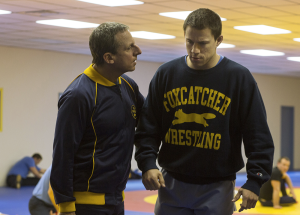
Steve Carell and Channing Tatum shed their normally comedic roles in the intense drama film “Foxcatcher.”
★★★☆☆
Sometimes watching a trailer can result in the entire plot being laid out clip-by-clip without any forewarning. It can leave an audience with the feeling that actually going to the movie would be a waste at that point, because they just saw all of the important moments reeled out in those three minutes.
The trailer for “Foxcatcher” is the complete opposite. In fact, the trailer alone is enough to amaze. It draws the crowd in with the superstar actors Channing Tatum and Steve Carell, confuses them with questions about how they will tackle their abnormally serious roles and leaves everyone intrigued, wondering how the drama of this true story will all play out.
That being said, “Foxcatcher” does not live up to the expectations set by the trailer. In the film, Olympian wrestler Mark Shultz, played by Channing Tatum, and millionaire John Du Pont, played by Steve Carell, team up in a business contract that quickly warps into a doomed relationship burdened by excess wealth and a lack of morality.
The story begins when Du Pont encourages Shultz with an opportunity to win a gold medal and emerge from beneath the shadow of his older brother, Dave Shultz (Mark Ruffalo). After growing up living paycheck to paycheck, Mark is easily lured by Du Pont into a contract to live and train on what he hopes to be the future training site of the U.S. Olympic Wrestling Team. This starts the trio down a path of loss, death, betrayal and most importantly, little happiness for the audience.
At points, the film slowly and painfully drags its viewers through minor details that seem to hold little importance to the main plot. It over-emphasizes aspects of the characters’ personalities that are not crucial to their overall development, and in doing so, it refuses to let even a little bit of hope find its way into the story. After a while, the experience begins to feel more like an obligation to get your money’s worth, rather than an enjoyable experience that you wished would last that much longer.
Apart from this overwhelming sense of dejection, the film also serves to remind the audience why wrestling does not occupy the same stage as professional basketball or soccer. Simply put, the sport is not a glamorous one. It is a very intricate, technique-based game that does not promote glitz and glam in the way other sports do. In a society where wrestling does not enjoy the popularity of other major sports, creating an engaging, relatable movie around it might have faced long odds.
The film does an adequate job illustrating a few other thematic points, mainly that money does not buy the respect of those from whom we most desire it. The highlight of the film is watching the audience’s disdain for Steve Carell’s character slowly but surely grow. By the end of the movie, the crowd is sure to hate John Du Pont and have a newfound respect for Carell’s ability to take on a role that breaks his comedic streak.
But what is a villain without a hero? To the disappointment of the audience, Channing Tatum’s character never embraces the role of the heroic protagonist. Here, the fault lies with the script and the true events that it had to work around. Dave Shultz seems to provide the only momentary relief from the dark embrace of the plot.
Overall, the film absolutely refuses to let the audience get the faintest glimmer of hope for a fairytale ending. It is clear from the get-go that evil will triumph over good, and without any sort of anticipatory tactics or hopeful moments of revelation to hold it through, the audience is left with a film that seems predestined to dampen the viewer’s mood.
“Foxcatcher’s” interplay of inherited wealth and working-class ambition provokes many profound questions. Nevertheless, these thought-provoking ideas are not enough to counteract the overbearing melancholy of the movie. The perpetually tense, no-win situation is not a happy crowd pleaser by any means, and if you are at first lured in by the big-name comedic actors, be warned that you will probably be far more depressed walking out of the movie theater than you had hoped to be.














